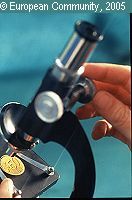Conflict over EU budget reveals wide support for more R&D spending
As reactions to the UK Prime Minister's criticism of the EU's spending priorities start pouring in, it appears that there is widespread support for increased European investment in science and innovation. Following the European Council meeting in Brussels on 17 and 18 June, Tony Blair lamented the fact that the EU spends ten times more on agriculture that it does on science and technology, research and development (R&D) or training. 'What I have an objection to is the EU deciding collectively that it is going to put 40 per cent of its budget into an area where you have got, what, two per cent of the employment. It makes no sense,' said Mr Blair, 'whereas you can imagine if we were spending some of that money on producing the innovation and technology for the future that is going to make our companies more competitive, then people would be saying: 'Right I understand what the EU is about'.' Danish Prime Minister Anders Fogh Rasmussen was one of the first to react, and he backed Mr Blair. 'We should do our utmost to make the EU the most competitive economy in the world and to achieve that goal we need much more investment in research, innovation and education,' said Mr Rasmussen. The pan-European microelectronics R&D body MEDEA+ also welcomed Mr Blair's comments. In an interview with Electronics Weekly, Arthur van der Poel, chairman of MEDEA+ stated: 'While we recognise the sensitivities surrounding the agricultural subsidy, there is one sector that gets one billion USD a year (820 million euro) in EU subsidy, and that's the tobacco industry. It's about the same amount as goes into supporting the entire ICT (Information and Communication Technology) industry,' he said. According to Gerard Matheron, Office Director at MEDEA+, the spending imbalance is even more pronounced in microelectronics, the principal driver of ICT innovation. As Dr Matheron explains, the level of European public support for microelectronics research in Europe has stayed the same for 15 years - at about 140 million euro annually. In an interview with Slovakian daily newspaper Sme, Slovakia's Prime Minister Mikulas Dzurinda also backed Mr Blair, stating that he was 'for reforms' and that his government was aware that it will not be able to support education and science as it would like unless more money is allocated into these areas.
Countries
Denmark, United Kingdom



